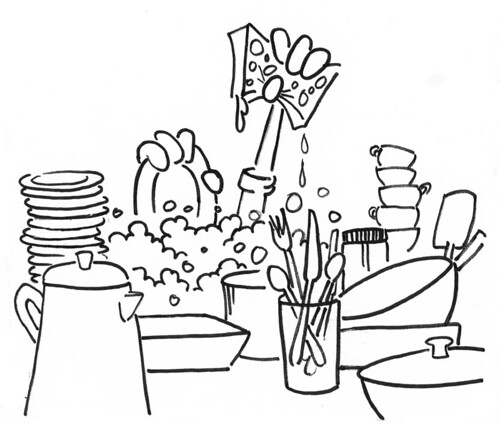Whether we like it or not, routine is very often the key to a productive life, even for those creatively chaotic types who loathe the idea of “everyday” or “usual”. It’s important to remember, however, that a routine doesn’t have to be bland and boring or the same thing everyone else does. According to Mason Currey’s book Daily Rituals: How Artists Work, Nicholson Baker gets up at half past four in the morning, writes for an hour and a half or thereabouts, and then goes back to bed til half past eight. Routine? Yes. Bland, boring and pedestrian? No.
 The main thing is to have a habitual element in your life which promotes the production of whatever it is you produce, be it words or music or thingamajigs. Such as Stephen King’s pre-writing ritual, which, like the more widespread before-bed ritual, gets him into the right frame of mind for what follows. There doesn’t even have to be a rational link between the one and the other, as long as it works. As the choreographer George Balanchine said, “When I’m ironing, that’s when I do most of my work.” (Is a board equivalent to a barre? The mind boggles.)
The main thing is to have a habitual element in your life which promotes the production of whatever it is you produce, be it words or music or thingamajigs. Such as Stephen King’s pre-writing ritual, which, like the more widespread before-bed ritual, gets him into the right frame of mind for what follows. There doesn’t even have to be a rational link between the one and the other, as long as it works. As the choreographer George Balanchine said, “When I’m ironing, that’s when I do most of my work.” (Is a board equivalent to a barre? The mind boggles.)
It’s not just a matter of scheduling, either. Consider the habits of monks and nuns. No, really. Their habits. As John Michael Talbot said (alas, I can’t find the reference), deciding what to wear in the morning is very simple: “Shall I wear this plain brown habit, or that plain brown habit?” Of course, clothing doesn’t have to be plain to be habitual. The composer Erik Satie had twelve identical suits of chestnut velvet with matching hats – anything but plain.
 Sometimes a little change is all it takes to make a big difference – as long as you make it in the right place. I discovered this for myself when I tried to figure out what I could do to increase my writing productivity. Why wasn’t I getting as much done as I used to? Because I had two or three short writing sessions instead of one long one, and I don’t work well in small chunks. Why had I moved from one long session to two or three short ones? Because I was starting later in the morning, and stopping at the same time – lunch – then trying to make up the time here and there later. So why was I starting later? Because I was sleeping later. Why? Because I wasn’t waking up. Obvious, yes, but what could be done about it?
Sometimes a little change is all it takes to make a big difference – as long as you make it in the right place. I discovered this for myself when I tried to figure out what I could do to increase my writing productivity. Why wasn’t I getting as much done as I used to? Because I had two or three short writing sessions instead of one long one, and I don’t work well in small chunks. Why had I moved from one long session to two or three short ones? Because I was starting later in the morning, and stopping at the same time – lunch – then trying to make up the time here and there later. So why was I starting later? Because I was sleeping later. Why? Because I wasn’t waking up. Obvious, yes, but what could be done about it?
For medical reasons which I will not go into, an alarming alarm is not workable for us. Instead we have a white-noise ‘alarm’ which starts with an almost inaudible whoosh and gets louder and louder until you wake up and turn it off. But it wasn’t waking me. Why? Because it was on the other side of the bed, and the Caped Gooseberry was the one waking up and turning it off, while I continued blissfully slumbering. Experiment: put the whoosh-whoosh on my side of the bed. Result: waking up a lot sooner! The precise point at which I wake up varies by about half an hour, depending on how deeply asleep I am when the whoosh-whoosh starts, but I have reclaimed hours from my morning. It’s not quite a chorus of angels, but it does the job.
 Unfortunately, this still hasn’t fixed the lying-awake-for-hours-when-I-go-to-bed problem, but it’s better than before. Which, coincidentally, is the title of a book about habits, written by Gretchen Rubin. She makes some interesting points about how it’s easiest to create habits that stick if we make strategies based on our own nature. Just because it works for someone else, doesn’t mean it will work for us, and there’s no point expending our energies in trying to make it.
Unfortunately, this still hasn’t fixed the lying-awake-for-hours-when-I-go-to-bed problem, but it’s better than before. Which, coincidentally, is the title of a book about habits, written by Gretchen Rubin. She makes some interesting points about how it’s easiest to create habits that stick if we make strategies based on our own nature. Just because it works for someone else, doesn’t mean it will work for us, and there’s no point expending our energies in trying to make it.
As Bernard Malamud said, “How one works, assuming he’s disciplined, doesn’t matter. If he or she is not disciplined, no sympathetic magic will help… Eventually everyone learns his or her own best way. The real mystery to crack is you.”









